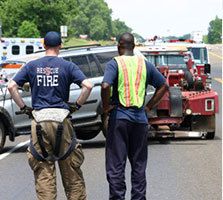If you sustained bodily injuries in an accident that was not your fault and the at-fault driver did not carry liability coverage (bodily injury coverage) to compensate you for the damages you sustained, you may still be able to obtain monetary recovery for your damages. First of all, you would have to sue the responsible party and obtain a judgment. A judgment is basically a court order signed by a judge directing the responsible party to pay you a certain amount of money awarded to you by the court. However, this is not the end of the process. You then have to turn this judgment into money by various collection means prescribed by Florida law. Please refer to our previous post on Different Ways to Collect on a Personal Injury Judgment Therefore, most attorney will not sue someone who is uninsured or underinsured because such people most likely do not have sufficient assets to go after to be able to turn the court judgment into money, and the litigation process can be very lengthy and costly.
If you have been injured by an uninsured or underinsured motorist and you are unable to find an attorney who would file suit against the responsible party, your only option may be to attempt to recover a portion of your damages through a small claims legal action. A small claims action is a legal action filed in a county court of appropriate jurisdiction and venue. The jurisdiction and venue, or the court where your claim is to be filed and heard, is determined by where the defendant lives, where the accident occurred, etc. It is called small claims because the maximum dollar amount you can recover in small claims court in Florida is limited to $5,000.00 or less, excluding costs, interest, and attorney’ fees.
Of course, if you want to recover damages in excess of $5,000.00, small claims court may not be an appropriate avenue for you if you want to recover the full extent of your damages. For example, you would need to file your claim either in a county court (if your damages are above $5,000.00 but do not exceed $15,000.00) or in a circuit court (if your damages exceed $15,000.00). This article, however, is limited to an overview of the small claims court process because the small claims process is relatively informal, expeditious and less costly and thus, pro se litigant friendly.
 Although it is always advisable that you have legal representation in court, you do not have to have an attorney to be able to bring an action for damages in small claims court. Most small claims courts have procedures, self-help information, approved forms for pro-se litigants and fee schedules for filing a small claims lawsuit on their website. For example, currently, for claims under $100 your filing fee is $55; for claims between $100.01 and $500 the filing fee is $80, for claims of $500.01 to $2,500 the filing fee is $175 and for claims between $2,501 and $5000 the fee is $300. There is also a summons fee of $10 for each named defendant. The fees change periodically, so you should always check the appropriate fee schedule.
Although it is always advisable that you have legal representation in court, you do not have to have an attorney to be able to bring an action for damages in small claims court. Most small claims courts have procedures, self-help information, approved forms for pro-se litigants and fee schedules for filing a small claims lawsuit on their website. For example, currently, for claims under $100 your filing fee is $55; for claims between $100.01 and $500 the filing fee is $80, for claims of $500.01 to $2,500 the filing fee is $175 and for claims between $2,501 and $5000 the fee is $300. There is also a summons fee of $10 for each named defendant. The fees change periodically, so you should always check the appropriate fee schedule.
A small claims suit is brought by filing a Statement of Claim form containing a detailed description of the claim along with two copies of any supporting documents with the county court and payment of the appropriate fees. The clerk of court then prepares the summons and Notice to Appear for service on the named defendant(s). The clerk of court will also schedule a pre-trial conference. If the defendant fails to appear, a default judgment will be entered in your favor.
If the defendant appears at the pre-trial conference and disputes the claim, the judge may require the parties to mediate the case. Mediation is a process in which all parties to a claim meet together and with the help of a neutral person called the mediator try to work out a mutually acceptable agreement to resolve the matter. The mediation can take place immediately after or even during the pre-trial hearing period and can take from one to two hours. Mediation services are offered free of charge to small claims litigants.
If you are unable to work out a resolution of the claim at mediation, the judge will schedule your case for trial where you and the defendant will be presenting your case. If you requested a jury trial in the Statement of Clam, you will argue your case to the jury. The jury will then reach its verdict by considering the evidence and the directions of the judge on the applicable law. If the jury comes back with a verdict in your favor, the judge will enter a legally enforceable final judgment against the responsible party.

The Bureau of Motorist Compliance has the authority to suspend a driver’s license, tags and registrations of an uninsured party for a period up to 20 years or until the judgment is satisfied. Usually, this can prompt the responsible party to pay your judgment or work out some sort of a payment plan with you to be able to get their driving privileges reinstated.
Our Joe Horrox Law team will be able to review your particular situation to determine the appropriate course for recovering your damages, inform you on the current state laws, assist you in filling out the proper paperwork and answer any questions or concerns you may have if we are unable to undertake representation in your case. Do not hesitate to call your Daytona Accident Attorney at 386-200-4283.
